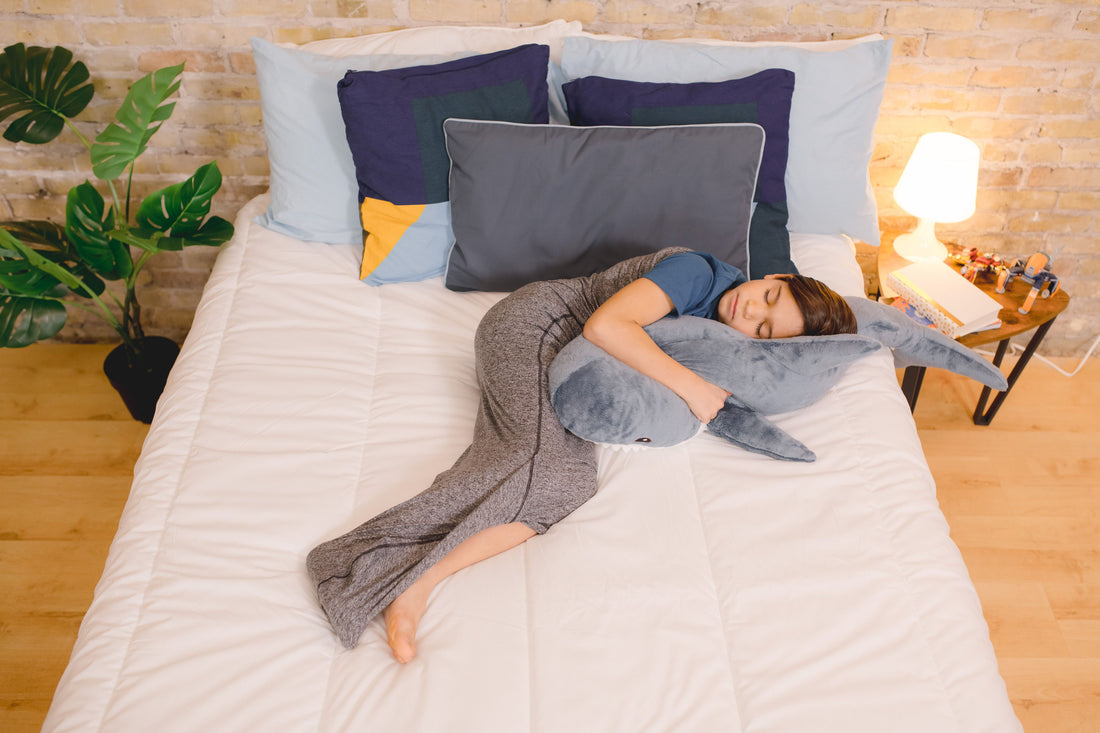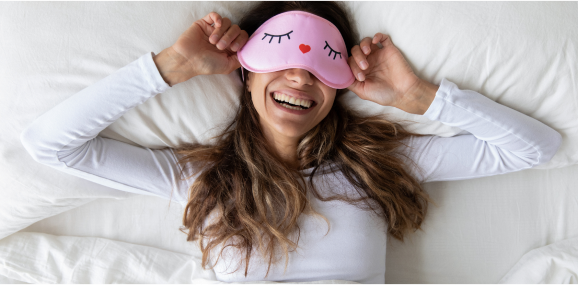Life moves fast. We have deadlines to meet, kids to drop off, and bills to pay. Keeping ourselves healthy in the midst of it all should be a top priority.
But in the conversation surrounding health and wellness, getting restful sleep is sadly underrated. Sure, many make time for daily exercise or healthy meals — but sleep? Back burner.
People hit the gym to find relief from anxiety and stress, which is great and all, but hitting the pillow is just as important. Sadly, deep and restful sleep eludes many people. But it doesn’t have to.
Let’s take a closer look at sleep, why it’s important, and how you can start catching better zzzs.
The Importance of Sleep for Your Health
You probably don’t have to be reminded how important sleep is for your body and mind. When we’ve had a restless night, we can feel it. The brain fog sets in, the yawning is constant, and our bodies feel drained of every last drop of energy.
Some look at restful sleep as a luxury, something that is great to have but not necessarily needed. But sleep is more than that — sleep is imperative to good health.
Multiple sleep studies have shown how inadequate sleep has detrimental effects on our physical and mental health. Chronic sleep deprivation has been linked to obesity and mood disorders, and is even known to impair your immune system. Long story short, sleep deficiency can seriously negatively impact your quality of life.
How Sleep Benefits Your Body and Mind
Quality sleep has benefits for both your physical and mental health. Sleep allows time for your body to recover, reset, and rejuvenate from all the demands of the day.
Here are just a few of the many benefits of good sleep.
Sleep and Your Immune System
Have you ever noticed how you tend to get sick when you’ve been tossing and turning for many nights? There is a reason for this — quality sleep is crucial for a healthy immune system.
A lot happens while we sleep. For example, our immune system is still working during sleep, producing important cytokines, which are small signaling proteins that are crucial during the immune response. Insufficient sleep disrupts this process.
Quality sleep helps to maintain a well-balanced immune defense.
Sleep and Heart Health
We all know how lousy we feel after a restless night, but most are unaware of how lack of sleep can affect our hearts.
Our blood pressure lowers during normal sleep; when sleep is absent, this blood pressure stays elevated and doesn't get a chance to regulate. Chronically elevated blood pressure can have adverse effects on overall heart health.
Sleep and Mood
You’ve probably heard the saying before, “Looks like someone woke up on the wrong side of the bed” — perhaps that saying has even been directed at you. But there is truth to the statement. Sleep has a significant impact on our mood.
It’s not complicated — better sleep promotes a better mood. When we sleep better, we feel better (and tend to be a lot less grouchy).
Sleep and Memory
Quality sleep also has a big role to play in mental sharpness and memory. Most of us have experienced the dreaded brain fog at some point in our lives. It makes us feel aloof and robs us of our mental clarity.
While we sleep, our brains are busy processing information from the day, making connections between events, and consolidating memories. This is especially important during the deep sleep cycle. Restful sleep helps improve this process.
Sleep and Stress
Stress affects everyone at some point in their lives. Experiencing stress while fleeing from danger is normal, but dealing with chronic stress from the demands of life is no friend to our health.
Dealing with stress can be complicated. While adequate sleep can reduce some of the effects of stress, stress can also make sleep difficult. Find ways to reduce stress that work for you — meditation, yoga, signing up for a sport, or even just watching some TV. The important part is that it calms you down and chills you out.
The Sleep Cycle and Deep Sleep
What does it mean to be a “deep sleeper?” Well, in one sense, it could mean someone is difficult to wake up. But, more accurately, a deep sleeper is someone who is totally immersed in stage three of the sleep cycle – but more on that in a bit.
Most experts say that adults need a minimum of around seven hours of sleep per night. Children need more to accommodate their constant physical and mental growth.
But the sad reality is that many people don’t come close to that number. In fact, according to sleep statistics put out by the CDC, 35.2% of all adults in the United States report sleeping less than seven hours per night on average.
The reasons for this can vary, and some of them are related to lifestyle. No matter the reasons, restful sleep is tied to our progression through the nightly sleep cycle.
The Stages of Sleep
While there are technically four stages of sleep, there are only two types of sleep — non-rapid eye movement (NREM) and rapid eye movement (REM). Typically, the average person will progress through these stages about four to six times per night, referred to as the sleep cycle.
Let’s take a look at the four sleep stages:
- Stage 1 – The first stage of NREM sleep occurs as your body begins to shut down, starting to transition from wakefulness to sleep. Your breathing, heart rate, and eye movements begin to slow, muscles relax, and brain activity decreases.
- Stage 2 –The second stage of NREM sleep is normally the longest. As sleep gets deeper, your breathing and heart rate continue to decrease. Your body temperature will also drop slightly, and your eye movement will be virtually still.
- Stage 3 – The third stage of NREM is known as slow-wave sleep — here, your heart rate, breathing, and brain activity are at their lowest levels. Eye movement has ceased completely.
- Stage 4 – The final stage is REM sleep, which typically occurs roughly 90 minutes after falling asleep. Heart rate and breathing will increase slightly, and eye movement will start again. This stage is vital for memory consolidation. It’s also when dreaming occurs.
Deep sleep, or slow-wave sleep, is associated with the slowest brain waves, occurring in Stage 3 of the sleep cycle. This stage typically lasts between 20 to 40 minutes. Experts believe it is this stage that offers the most restorative sleep.
Tips for Achieving Better Sleep
Achieving deep and restful sleep is possible. Here are some important tips to get you on your way to being a “deep sleeper.”
Establish a Bedtime Routine
Healthy sleep starts by developing habits and by establishing a bedtime routine that works for you. Your bedtime schedule is a great place to start. Try to go to sleep and wake up at the same time every day.
This can also include the “winding down” process, typically 30 to 60 minutes before bed. A routine could even consist of a warm bath, reading, listening to calming music, or anything that might help relax you.
This also includes fine-tuning your sleeping environment. Keeping the space cool and dark is a good rule of thumb. Unplugging from electronics is the last crucial step in any good bedtime routine. Electronics generate blue light, which may decrease the production of melatonin — an essential sleep hormone.
Regular Exercise and Strategic Diet
Being physically active during the day does wonders for your health, but it can also make it easier to sleep at night. Even 20 to 30 minutes of exercise a day could be beneficial come bedtime.
Your diet is equally as important. What you put into your body matters, especially as it gets closer to lights out. Avoid large meals before bed because digestion could interrupt your sleep — eat no less than three hours before turning in.
Also, avoid alcohol and caffeine right before bedtime. These also contribute to sleep disruptions during the night.
Give the Sleep Pod a Try
The Sleep Pod is designed with better sleep in mind.
Something is calming about the feeling of a heavy blanket or a warm hug. The gentle pressure offers a feeling of contentment and helps soothe. Sleep Pod understands this.
Sleep Pod utilizes the ideas behind Deep Touch Pressure Stimulation (DTPS), which has been shown to help relaxation and relieve restlessness.
With its ultra-breathable, lightweight material, the Sleep Pod’s unique cocoon-like shape provides a gentle, calming pressure throughout your body. It provides you with a seven-hour hug throughout the night.
The Sleep Pod was designed to accommodate pillows as well. So, whether you’re the type that likes to sleep with a pillow between your knees or just enjoy hugging one as you drift off, Sleep Pod has you covered.
Summary
The importance of sleep for our health and overall quality of life cannot be overstated. Getting restful sleep is crucial for both our body and our mind.
A lot happens after we lay our heads down at night. Our body rejuvenates from the demands of the day, and sleep helps get us ready for the next one. Developing healthy daily habits and a sleep routine are essential.
Whether it’s winding down with a good book or enjoying the calming pressure from the Sleep Pod, deep, restful sleep is possible!
Sources:
The Extraordinary Importance of Sleep | NIH
Sleep & Immunity: Can a Lack of Sleep Make You Sick? | SleepFoundation.org
How Does Sleep Affect Your Heart Health? | CDC

































500,000+ happy customers